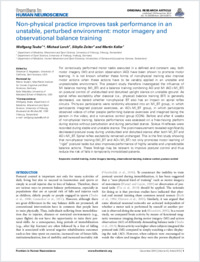Non-physical practice improves task performance in an unstable, perturbed environment: motor imagery and observational balance training
- Taube, Wolfgang Department of Medicine, Movement and Sport Science, University of Fribourg, Switzerland
- Lorch, Michael Department of Sport Science, University of Freiburg, Germany
- Zeiter, Sibylle Department of Medicine, Human Movement and Sport Sciences, Universities of Geneva, Switzerland
- Keller, Martin Department of Medicine, Movement and Sport Science, University of Fribourg, Switzerland
-
2014
Published in:
- Frontiers in Human Neuroscience. - 2014, vol. 8, p. 972
English
For consciously performed motor tasks executed in a defined and constant way, both motor imagery (MI) and action observation (AO) have been shown to promote motor learning. It is not known whether these forms of non-physical training also improve motor actions when these actions have to be variably applied in an unstable and unpredictable environment. The present study therefore investigated the influence of MI balance training (MI_BT) and a balance training combining AO and MI (AO+MI_BT) on postural control of undisturbed and disturbed upright stance on unstable ground. As spinal reflex excitability after classical (i.e., physical) balance training (BT) is generally decreased, we tested whether non-physical BT also has an impact on spinal reflex circuits. Thirty-six participants were randomly allocated into an MI_BT group, in which participants imagined postural exercises, an AO+MI_BT group, in which participants observed videos of other people performing balance exercises and imagined being the person in the video, and a non-active control group (CON). Before and after 4 weeks of non-physical training, balance performance was assessed on a free-moving platform during stance without perturbation and during perturbed stance. Soleus H-reflexes were recorded during stable and unstable stance. The post-measurement revealed significantly decreased postural sway during undisturbed and disturbed stance after both MI_BT and AO+MI_BT. Spinal reflex excitability remained unchanged. This is the first study showing that non-physical training (MI_BT and AO+MI_BT) not only promotes motor learning of “rigid” postural tasks but also improves performance of highly variable and unpredictable balance actions. These findings may be relevant to improve postural control and thus reduce the risk of falls in temporarily immobilized patients.
- Faculty
- Faculté des sciences et de médecine
- Department
- Département de Médecine
- Language
-
- English
- Classification
- Biological sciences
- License
-
License undefined
- Identifiers
-
- RERO DOC 234266
- DOI 10.3389/fnhum.2014.00972
- Persistent URL
- https://folia.unifr.ch/unifr/documents/304234
Statistics
Document views: 129
File downloads:
- pdf: 210
